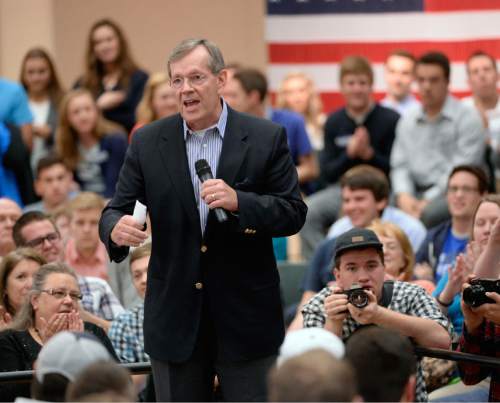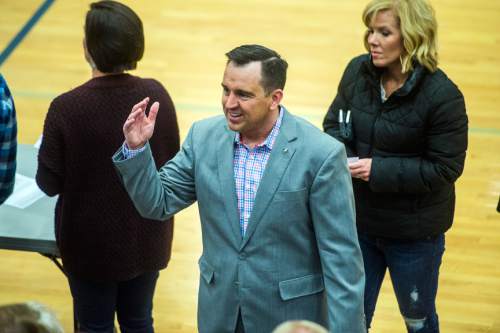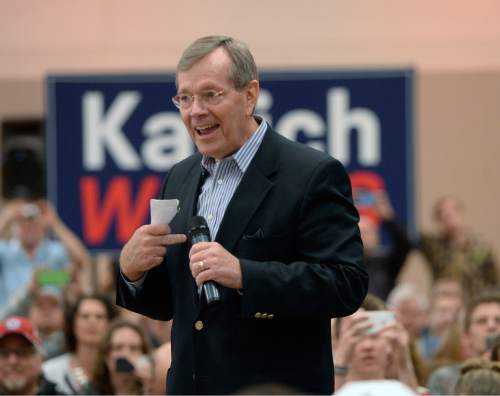This is an archived article that was published on sltrib.com in 2016, and information in the article may be outdated. It is provided only for personal research purposes and may not be reprinted.
Former Gov. Mike Leavitt, who was the field marshal for Mitt Romney's 2012 presidential bid, predicted Tuesday that Donald Trump would not get the delegates he needs to win the nomination before the Republican Convention, but the Utah native has serious doubts that Trump or Texas Sen. Ted Cruz could win the White House in November.
"I have very serious doubts that Donald Trump can win the presidency as the Republican nominee. I think it's quite possible he could win the nomination, but I don't think he can win," Leavitt told reporters. "And I look at Cruz and say, 'How does the electoral map work with a Cruz nomination?' … Right now, if you win the nomination and lose the presidency, the party has not been well-served."
Leavitt predicted that Trump would fall short of the 1,237 delegates he needs to secure the nomination heading into the party's July convention in Cleveland, which would lead to the first brokered convention since 1952.
"I can see a mathematical path" for Trump to get the necessary delegates, Leavitt said. "I don't see a practical path for either of them to get 1,237. I think we're going to have a contested convention. Now the degree to which it's contested is still up in the air."
Utah House Speaker Greg Hughes, R-Draper, who is supporting Trump, said he thinks people are underestimating Trump's chances in November and his appeal to working-class and disaffected voters.
"There is a middle-America vote where Trump's message is really resonating," Hughes said. "That's a world of people that I think is really underestimated."
Damon Cann, a political science professor at Utah State University, said there is a "meaningful probability" there will be a contested convention and, if Trump does muster the votes, it likely won't be until the California primary in June. The Pennsylvania contest also looms large, Cann said.
"If it goes to that point" of an open convention, Cann said, "all sorts of crazy stuff can happen."
Leavitt, the former Utah governor and U.S. Health and Human Services Secretary, was a top adviser to Romney's 2012 White House bid and widely believed to be the favorite to be chief of staff in a Romney presidency.
This year, he supported Ohio Gov. John Kasich in the Utah caucuses. Kasich finished a distant second to Cruz, who won 69 percent of the vote, compared to Kasich's 17 percent. Trump managed just 14 percent.
Voters were swayed, Leavitt said, by encouragement from Romney and Utah Gov. Gary Herbert to vote for Cruz because he had the best chance to stop Trump.
Leavitt said he has not decided whether he would back Trump if he wins the nomination. When asked if he would support Cruz, he said, "I want a Republican president."
He said Trump has tapped into the same anger as the Howard Beale character in the 1976 movie "Network," the television newsman who famously proclaimed: "I'm mad as hell, and I'm not going to take it anymore."
"There is more sociology happening right now than there is politics," Leavitt said Tuesday in a speech to a group of Utah business leaders hosted by the Utah World Trade Center.
The chances Trump will get the necessary 1,237 delegates, Leavitt said, "are certainly not zero, but there are many pathways where we would not get [there]."
If Trump gets close, within 50 delegates or so, Leavitt said Trump could drum up the support he needs among the Republican superdelegates — the national committee members and party chairmen and chairwomen from around the country who are free to support whomever they want — to get the nomination.
But if he ends up further out, an open convention is likely, Leavitt said. There would likely be battles over rules and, if it goes to multiple rounds of balloting, organizers may revamp the schedule to provide more time for voting — and deals will be made to try to bring some closure to the process.
Leavitt said there are four possible outcomes at a brokered convention:
• Trump gets the 1,237 delegates he needs to win the nomination
• He doesn't get the votes needed and it ends up going to a second ballot, where Cruz could make a move to win the nomination
• Kasich pulls off what he called the "Steven Bradbury Strategy," after an Australian short-track speedskater in Utah's 2002 Winter Olympics who won the gold medal by skating slow and staying out of the rumpus until the other competitors crashed
• None of the current candidates can get the support after several rounds of balloting and the convention changes the rules to let an outside candidate emerge
"The chances of that one happening are pretty low," Leavitt said of the last possibility.
Whether the party can mend fences after a contentious convention remains to be seen, he said.
"This is a deeper schism in the Republican Party than we have seen before and it has been magnified, and I think there is a reasonable question to ask whether or not the Republican Party will unify with all three of the candidates," he said.
Violence at both the Republican and Democratic conventions is also a possibility, Leavitt said.
There have already been clashes between Trump supporters and protesters at campaign events, most notably violence that forced cancellation of a recent Trump event in Chicago.
"I just think that there is some significant possibility that some level of [violence] will occur, and how will it affect the outcome?" Leavitt said.
Cann said that if a dark-horse candidate emerges — someone other than Cruz or Trump, House Speaker Paul Ryan or Florida Sen. Marco Rubio, for example — that person is at a significant disadvantage heading into an election.
"These people don't have campaign organizations existing out in the states," Cann said. "They haven't been running campaign fundraising operations with an eye toward the general election or any of the kind of things candidates are normally doing."
"On the other hand," Cann said, "having Trump as your nominee also puts you at a significant disadvantage in the general election."
National polls have consistently shown Trump trailing Democrat Hillary Clinton or Bernie Sanders by double digits.
"It's just kind of a crummy election for Republicans," Cann said.
The situation that Trump faces is similar to where the Romney campaign found itself in April 2012, when it was uncertain whether former Pennsylvania Sen. Rick Santorum would stay in the race and be able to deny Romney the delegates needed to win the nomination before the convention.
Leavitt and the Romney campaign put together a plan that they ended up not needing once Santorum dropped out of the race.
The Republican National Committee made changes to the process to keep the party's nominee from being dragged through a protracted primary battle, but Leavitt said the party couldn't have anticipated 17 candidates in the race, or the role of Super PACs enabling candidates to stay in the race longer — and nobody anticipated Trump's success.
Twitter: @RobertGehrke







